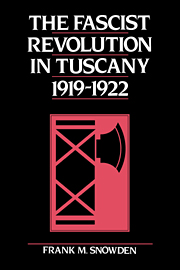3 - Big business and Mussolini
Published online by Cambridge University Press: 02 November 2009
Summary
ECONOMIC VULNERABILITY
If the struggle between socialism and landed property was the principal contest on which fascist success in postwar Tuscany was based, an important secondary source of strength was derived from the urban centres. In this section, then, we must take up the question of the urban support for Tuscan fascism. In the towns, as in the countryside, there was a division between the clearly articulated and powerful interests of capital on the one hand and the popular rank and file that swelled the squads on the other. It is important to examine each of these groups in turn, in order to answer both the empirical question of who supported the fasci, and the interpretative question of the significance of each source of fascist strength for an analysis of the movement. Does the evidence from Tuscany support the idea of fascism as the armed militia of monopoly capital or the notion that the movement was the political extremism of the petty bourgeoisie? To answer these questions, we must turn first to the Tuscan board room.
Fascism for heavy industry, as for landed property and provincial manufacturing, was a response to the combined pressure of economic crisis and political challenge. It is useful, however, to treat the pro-fascism of the giant companies as a case apart because it had its own characteristics and special limitations.
- Type
- Chapter
- Information
- The Fascist Revolution in Tuscany, 1919–22 , pp. 121 - 156Publisher: Cambridge University PressPrint publication year: 1989



